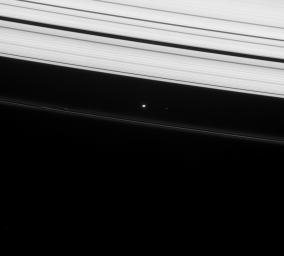Prometheus shines brightly in this image, taken as part of the ongoing campaign to precisely determine the orbits of Saturn's small moons.
Moons are usually quite bright in this type of observation, due to the long exposure times employed. Long exposures are required in order to gather enough light so that dim, 12th (or even 13th or 14th) magnitude stars are visible in the background, making it possible to determine where the Cassini spacecraft is pointed on the sky with great accuracy. Imaging scientists are then able to precisely determine the position of the moon's center, thus refining their understanding of the moon's orbit and any changes to it over time due to perturbations by other moons.
Two stars can be seen in this view: one to the right of Prometheus and one near lower left.
Exterior to Prometheus (102 kilometers, or 63 miles across) is the F ring, with its inner and outer flanking ringlets and a streamer channel created by the moon. The outer A ring is seen at top.
This view looks toward the unilluminated side of the rings from about 21 degrees above the ringplane. The image was taken in visible light with the Cassini spacecraft narrow-angle camera on Jan. 22, 2008. The view was obtained at a distance of approximately 1.7 million kilometers (1.1 million miles) from Prometheus and at a Sun-Prometheus-spacecraft, or phase, angle of 34 degrees. Image scale is 10 kilometers (6 miles) per pixel.
The Cassini-Huygens mission is a cooperative project of NASA, the European Space Agency and the Italian Space Agency. The Jet Propulsion Laboratory, a division of the California Institute of Technology in Pasadena, manages the mission for NASA's Science Mission Directorate, Washington, D.C. The Cassini orbiter and its two onboard cameras were designed, developed and assembled at JPL. The imaging operations center is based at the Space Science Institute in Boulder, Colo.
For more information about the Cassini-Huygens mission visit http://saturn.jpl.nasa.gov/home/index.cfm. The Cassini imaging team homepage is at http://ciclops.org.

 Planetary Data System
Planetary Data System












